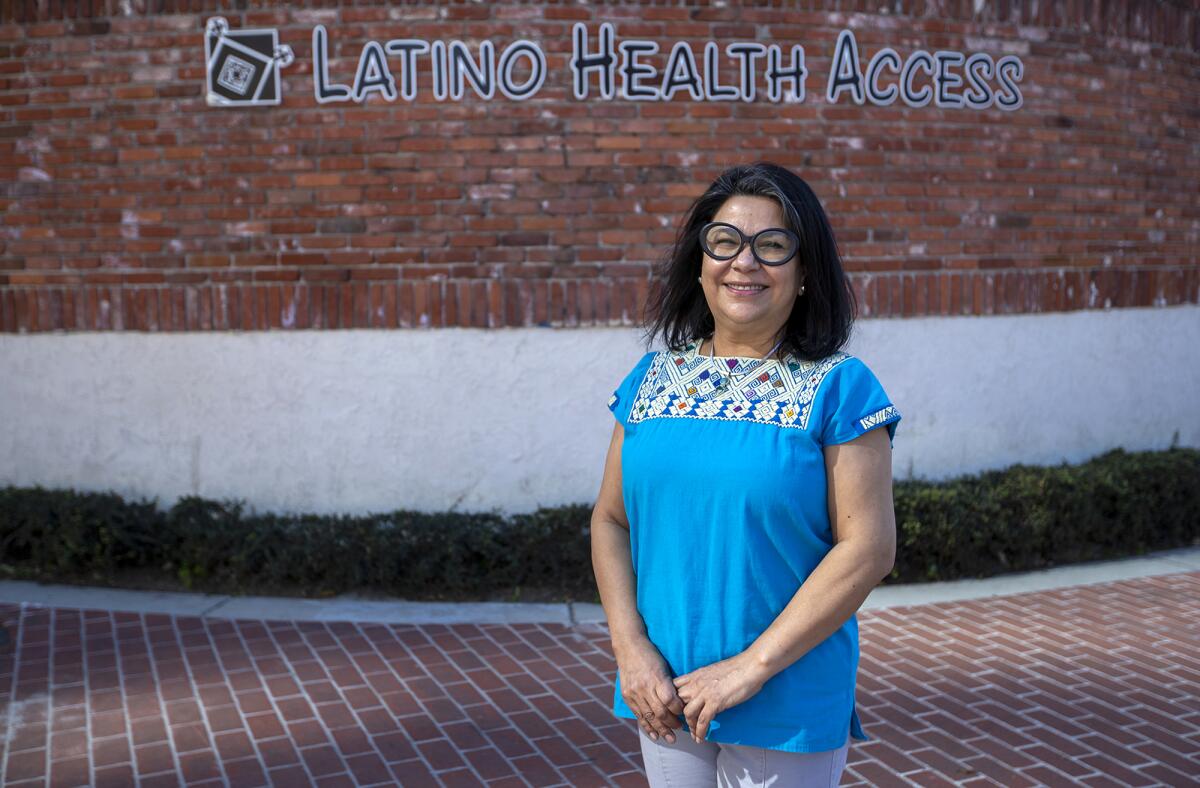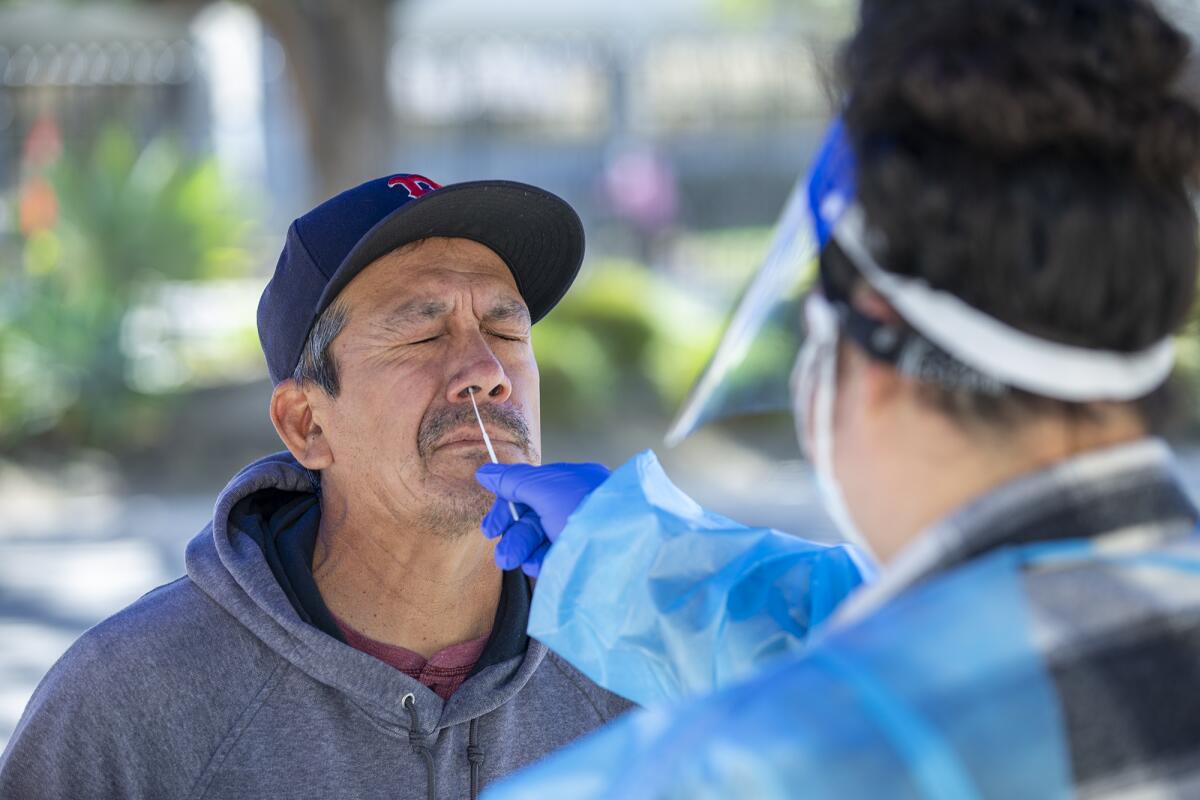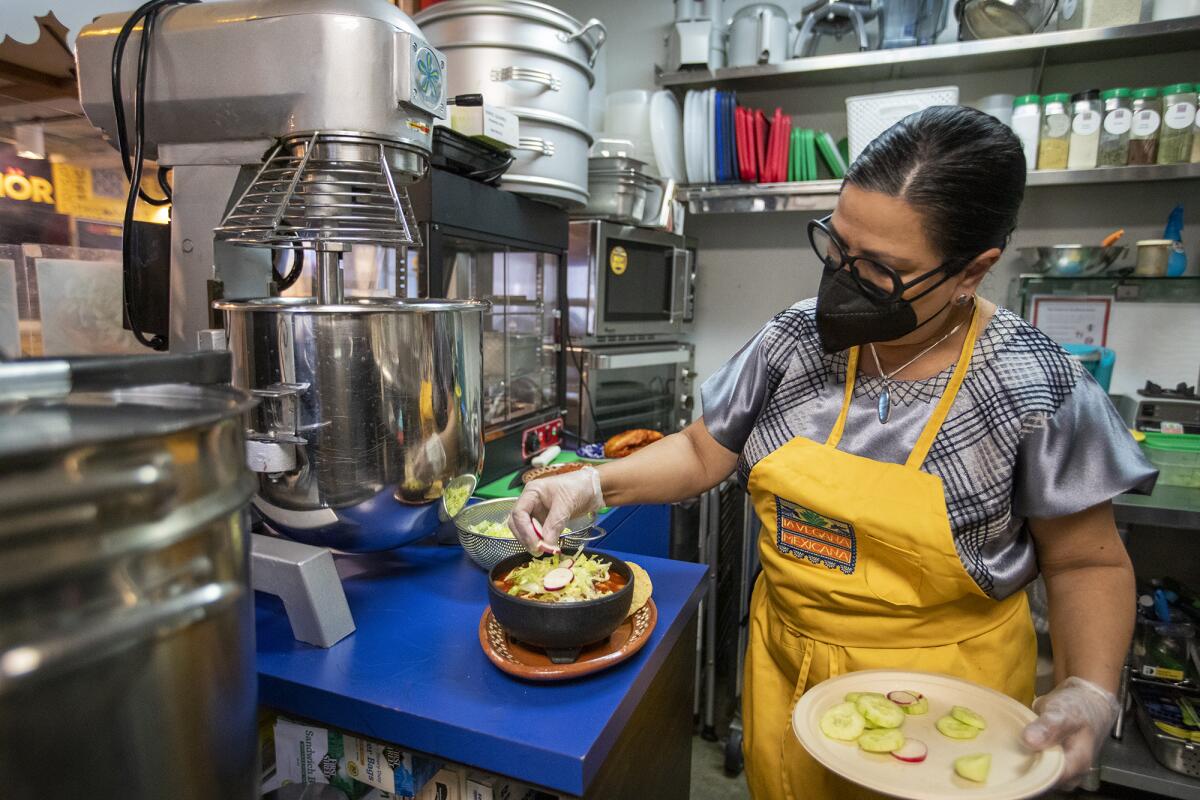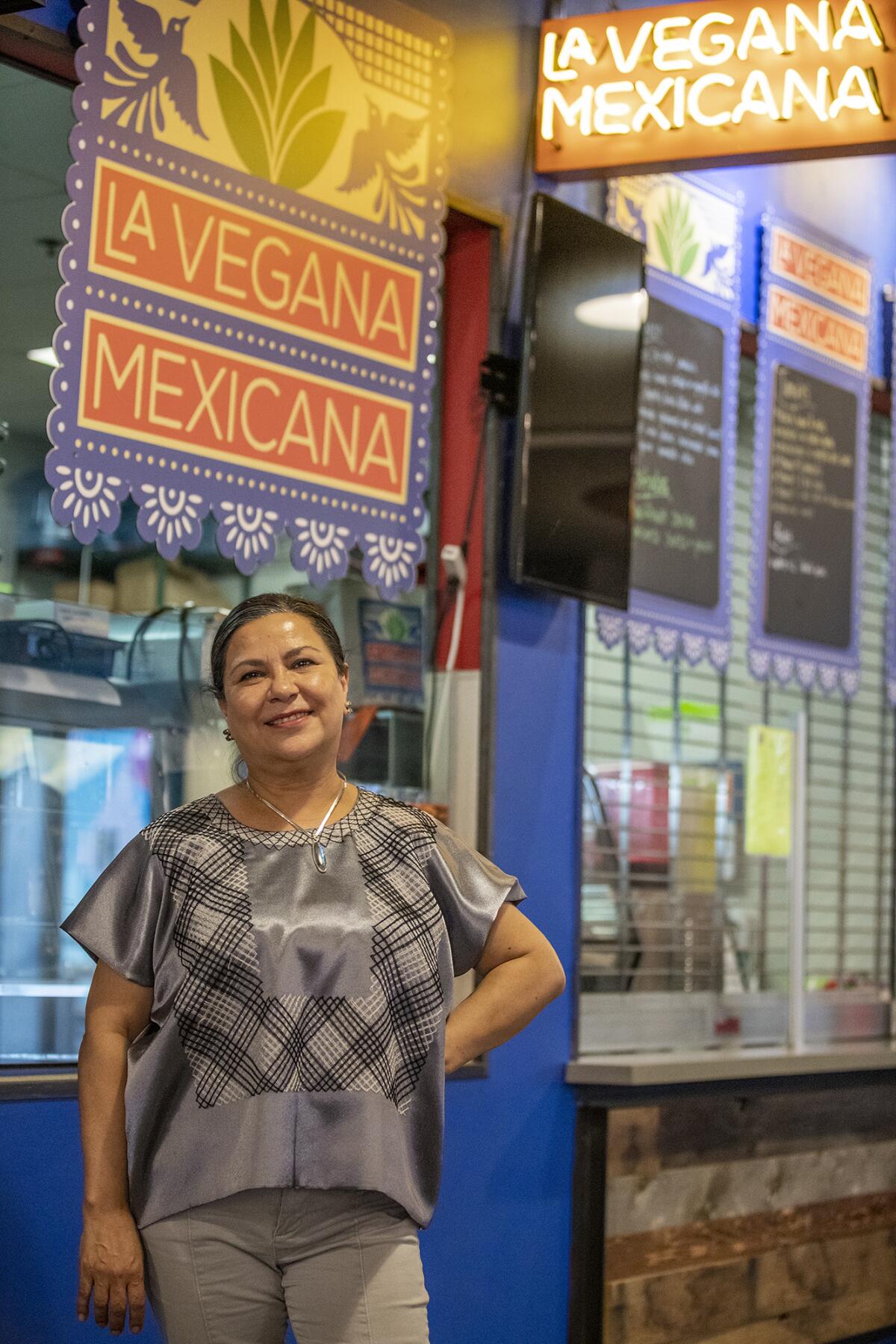Loreta Ruiz helps keep Latinos healthy with vaccines and vegan Mexican food

The community room at Latino Health Access in Santa Ana once hummed with social activities, including the group’s annual fundraising tamaladas, but as the pandemic heads into its third year, it’s home to a weekly vaccine clinic.
On a recent day at the site, a young Latina with her curly hair pulled up into a bushy ponytail sat anxiously. She rolled up the sleeve of her black Pikachu shirt as her father gave a reassuring hug. After a quick shot, the girl headed for the exit when Loreta Ruiz, carrying a clipboard, turned her around to a row of seats for 15 minutes of monitoring.
For the act of bravery, she gave the girl a sticker of a heart wearing a cape that read: “vaccinated, superhero, I care for others.”
“At the beginning of the winter surge, we had a lot of demand,” said Ruiz, COVID-19 response associate director with Latino Health Access. “Now, our numbers for vaccination are dropping slightly.”
Wearing a pair of bold, tea-shade glasses that rested atop her white KN95 mask, the energetic health advocate and restauranteur headed to her office, a once convivial upstairs space long quieted by remote work.
From there, Ruiz explained how she has confronted the pandemic on twin fronts since it began.
She works for Latino Health Access, a nonprofit at the forefront of addressing health inequities in Latino communities around Orange County and is also the owner of La Vegana Mexicana, a downtown Santa Ana restaurant that has weathered economic hardships to continue serving its menu of plant-based pambazos, tamales and tostadas.
“Community work is a lifestyle,” Ruiz said. “The needs of other people move you. La Vegana Mexicana is my passion and it’s also the business of my children. I’m happy that I’ve been able to keep the lights on.”
A Mexico City native, Ruiz began her career working for the Mexican government’s ministry of foreign affairs. In time, she transferred to consulates in Los Angeles and Santa Ana.
Ruiz left the Mexican Consulate behind in 2015 and took a job with Latino Health Access but parted ways in 2019 to move La Vegana Mexicana, which began as a pop-up, into its current home at 4th Street Market.
When the onset of the coronavirus pandemic put Latino Health Access on red alert a year later, Dr. America Bracho, its founder and executive director, asked Ruiz to come back.
“It’s hard to say ‘no’ to America,” she said, with a laugh.
In the early days, the organization’s call center flooded with questions from panicked residents. Outbreaks that outpaced limited testing capacities spread throughout entire buildings of apartment complexes in Latino working-class neighborhoods.
People were falling ill, losing their jobs, going hungry and fearing eviction.
“America told us at the beginning, ‘We are flying the plane and building it at the same time,’” Ruiz said.

Meanwhile, as a restaurant owner, she tried to keep the business she built with her son and daughter from falling apart.
The pandemic prompted Ruiz to leave a shuttered 4th Street Market for Latino Health Access’ industrial kitchen at the Corazones Verdes Park in Santa Ana, where takeout orders for delivery were prepared.
“It was a time of great uncertainty and distress,” she said. “I would have been very sad if I had lost my restaurant.”
As La Vegana Mexicana struggled to stay afloat, Ruiz put in seven-day workweeks at Latino Health Access, like many of her co-workers, and helped shepherd early efforts to set up testing clinics in the community. The organization also pushed county government to provide better testing data to identify coronavirus “hot spots” and chart its inequitable spread.
Toward the end of 2020, Latino Health Access geared up for a vaccination campaign that continues today, an effort that entails overcoming language, digital and misinformation barriers to equity.
“The first vaccine clinic that we had with St. Joseph was in an alley by Minnie Street in Santa Ana,” Ruiz recalled of the working class neighborhood. “We would see people coming back from work with paint-stained shoes, hungry and tired, getting their matrícula card out as identification. They ended up finding a clinic in the neighborhood. We’ve continued with that model.”
When Omicron surged this winter, Latino Health Access administered 8,500 tests in January alone when its clinics posted positivity rates above 35%.
Testing efforts continue, even as cases drop. Ruiz points to an open test kit on her desk that includes a long swab intended for the mouth, not the nose. Latino Health Access is partnering with a lab to provide 55,000 take-home PCR tests.
The group’s Santa Ana office now doubles as a drop-off center. As in the past, they translated test instructions into Spanish.
Whether with labs, county government, local cities or other nonprofits, the pandemic has forged new and stronger relationships for Latino Health Access in O.C., where the coronavirus has disproportionately impacted Latinos.
“Latino Health Access has taken the lead,” Ruiz said. “Partnerships are key. In the end, that’s going to benefit our community. We need to continue being seated at the table where decisions are made. Our voices need to be heard.”

After a full day at Latino Health Access, Ruiz heads over to 4th Street Market, where her restaurant returned, on weeknights to prepare food; she also staffs La Vegana Mexicana on weekends.
Business began to rebound from the pandemic — and then OC Streetcar construction plowed through La Cuatro, as Latino residents know the historic thoroughfare.
“As we say at Latino Health Access, if we’re not part of the conversations,” she said, “then we’re on the menu.”
There’s continuity between the two lives she leads as a public health advocate and plant-based restauranteur.
Looking back, Ruiz realized that her father, a doctor who practiced homeopathic medicine, was vegan before the term became popularized.
“He was lactose intolerant,” she said, “and always thought it wasn’t healthy to eat meat.”
Veganism didn’t extend to the rest of the household. But her father urged that half of his children’s plates be greens and would have them do dietary detoxes with him.
Ruiz practiced vegetarianism on-and-off for several years and kept meat to a minimum when she did indulge. In 2014, her daughter developed an autoimmune disease which prompted a renewed look at veganism.
“She was forced to try different diets,” Ruiz said. “She had to go without gluten and legumes until she realized she wasn’t allergic to either but being vegan helped her the most. That was a very difficult process.”
So, too, was reimagining Mexican food in a plant-based paradigm. At least, at first.

Ruiz experimented with different recipes without much success, including a flan too rubbery in texture and a quesadilla that even her dog didn’t want.
But then, Ruiz made vegan ceviche so tasty and refreshing that it restored confidence in her kitchen. When her daughter craved tamales, Ruiz spent two years finding the right masa mix — all without manteca, or lard, of course.
She tested her vegan tamales out by handing them to fellow Latino Health Access co-workers at the time. Soon, they were included in the organization’s annual tamaladas before becoming fixtures on La Vegana Mexicana’s menu, with black bean, nopalito, mushroom and a variety of fruit fillings.
The tamales join a list of offerings that steer clear of mock meats and are nearly gluten and soy free.
“What I try to do is get to the texture and flavor using only vegetables, fruits and legumes,” Ruiz said. “That’s the grado de dificultad, the degree of difficulty.”
From her unique vantage point, Ruiz knows that healthy eating is no substitute for vaccination in a public health pandemic.
“Of course, coronavirus is going to affect people with health conditions more,” she said. “In my case, I’m healthy, but I don’t want to get my daughter or my parents sick.”
She considers her twin vocations to be grounded in a sense of cultural competency with a dash of creative daring to reimagine what constitutes good health, something that’s on the minds of many these days.
“I want people to understand that they can eat mindfully and meet their nutritional needs without sacrificing their culture or traditions,” Ruiz said. “At Latino Health Access, the same concept applies. Health is addressed in a holistic manner and in a way that meets the community where they are without trying to change them.”
All the latest on Orange County from Orange County.
Get our free TimesOC newsletter.
You may occasionally receive promotional content from the Daily Pilot.




